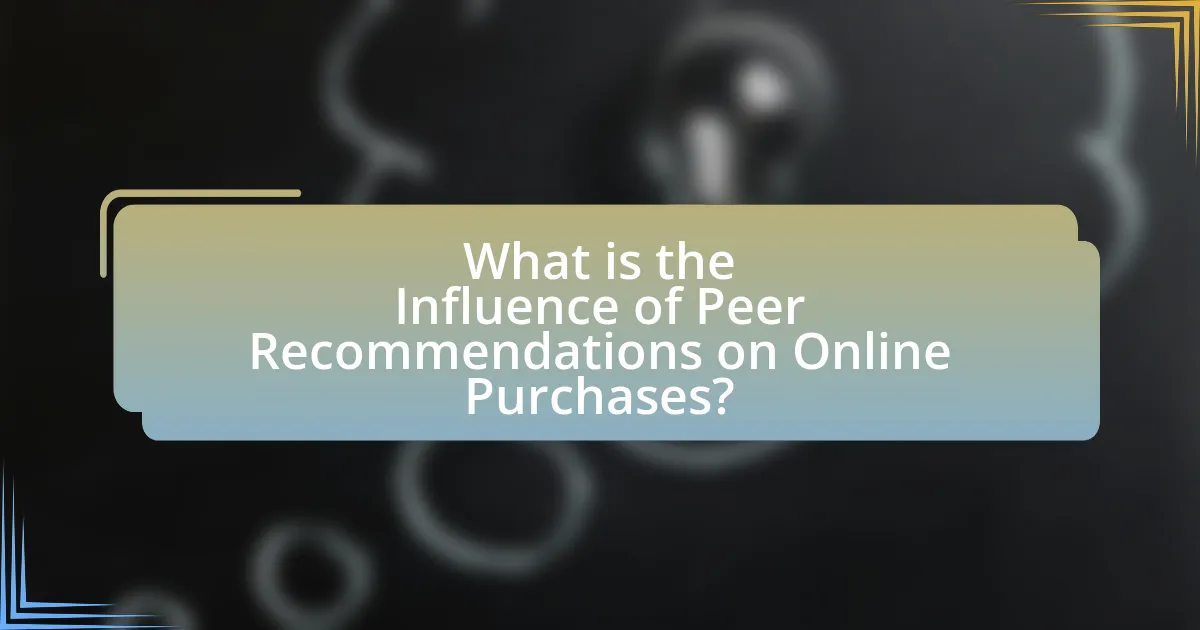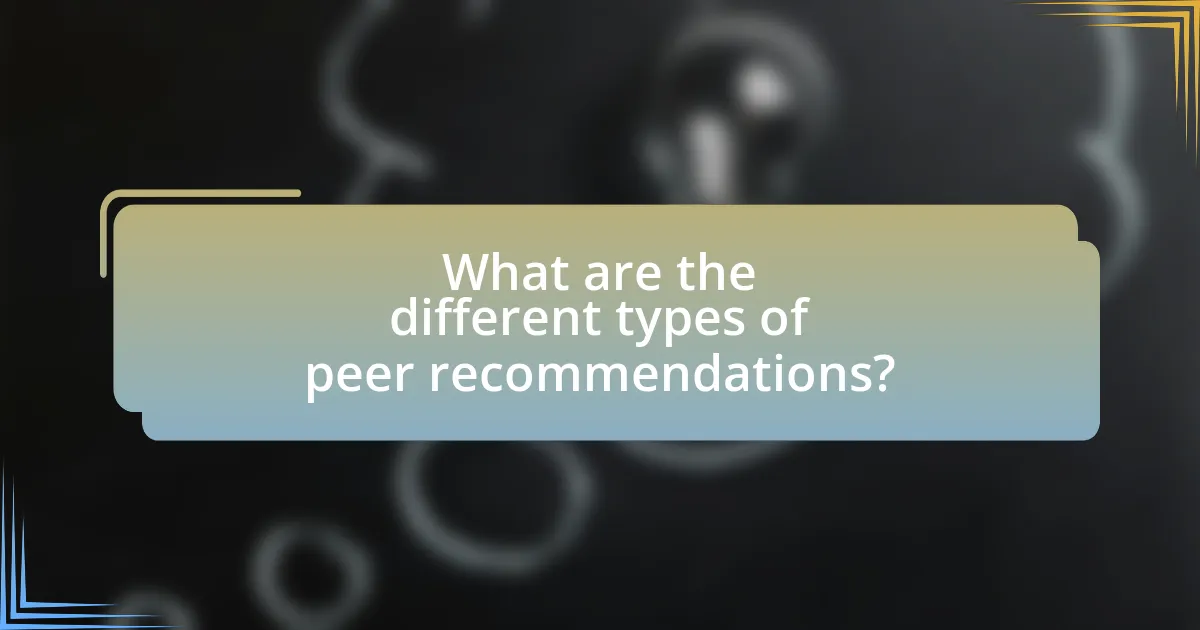The article examines the significant influence of peer recommendations on online purchases, highlighting how they enhance consumer trust and reduce perceived risk. Research indicates that a substantial majority of consumers trust online reviews as much as personal recommendations, with peer feedback driving higher conversion rates and brand loyalty. It explores the psychological factors behind this influence, compares peer recommendations to traditional advertising, and discusses the role of social media and online reviews in shaping consumer behavior. Additionally, the article outlines various types of peer recommendations, their effectiveness, and strategies businesses can implement to leverage this powerful marketing tool while addressing potential challenges.

What is the Influence of Peer Recommendations on Online Purchases?
Peer recommendations significantly influence online purchases by enhancing consumer trust and reducing perceived risk. Research indicates that 79% of consumers trust online reviews as much as personal recommendations, demonstrating the power of peer influence in shaping buying decisions. Additionally, a study by BrightLocal found that 91% of consumers read online reviews, with 84% trusting them as much as a friend’s recommendation. This reliance on peer feedback drives higher conversion rates and encourages brand loyalty, as consumers are more likely to purchase products that have been positively reviewed by their peers.
How do peer recommendations impact consumer behavior?
Peer recommendations significantly influence consumer behavior by enhancing trust and credibility in purchasing decisions. Research indicates that 79% of consumers trust online reviews as much as personal recommendations, demonstrating the power of peer influence. This trust leads to increased likelihood of purchase, as consumers often rely on the experiences of others to guide their choices, particularly in online environments where personal interaction is limited. Furthermore, studies show that products with higher ratings and positive peer feedback can see a sales increase of up to 18%, underscoring the direct correlation between peer recommendations and consumer purchasing behavior.
What psychological factors drive the influence of peer recommendations?
Psychological factors that drive the influence of peer recommendations include social proof, trust, and the desire for conformity. Social proof occurs when individuals look to the behavior of others to guide their own actions, particularly in uncertain situations; studies show that 70% of consumers trust peer reviews as much as personal recommendations. Trust is established through perceived credibility of the recommender, which is heightened when the recommender shares similar characteristics or experiences with the recipient. The desire for conformity drives individuals to align their choices with those of their peers to fit in or gain social acceptance, as evidenced by research indicating that people are more likely to purchase products recommended by friends or family.
How do peer recommendations compare to traditional advertising?
Peer recommendations are generally more effective than traditional advertising in influencing consumer purchasing decisions. Research indicates that 92% of consumers trust peer recommendations over advertisements, highlighting the credibility and relatability of personal endorsements. Additionally, a study by Nielsen found that 70% of consumers trust online reviews from strangers, which further emphasizes the impact of peer influence compared to traditional advertising methods that often lack personal connection and authenticity.
Why are peer recommendations important in the online shopping environment?
Peer recommendations are important in the online shopping environment because they significantly influence consumer purchasing decisions. Research indicates that 79% of consumers trust online reviews as much as personal recommendations, highlighting the credibility and impact of peer feedback. Additionally, peer recommendations can enhance perceived product quality and reduce the perceived risk associated with online purchases, leading to higher conversion rates and customer satisfaction.
What role do social media platforms play in peer recommendations?
Social media platforms significantly enhance peer recommendations by facilitating the sharing of opinions and experiences among users. These platforms allow individuals to post reviews, ratings, and personal testimonials about products or services, which can influence the purchasing decisions of their peers. Research indicates that 79% of consumers trust online reviews as much as personal recommendations, highlighting the impact of social media interactions on consumer behavior. Furthermore, platforms like Facebook, Instagram, and Twitter enable users to engage with content through likes, shares, and comments, amplifying the reach and credibility of peer recommendations. This interconnectedness fosters a community-driven approach to decision-making, where users rely on the insights of their social networks before making purchases.
How do online reviews and ratings contribute to peer recommendations?
Online reviews and ratings significantly enhance peer recommendations by providing credible, user-generated content that influences consumer perceptions. These reviews serve as social proof, where potential buyers rely on the experiences of others to gauge the quality and reliability of a product or service. Research indicates that 79% of consumers trust online reviews as much as personal recommendations, highlighting their impact on decision-making. Furthermore, platforms like Yelp and TripAdvisor show that higher ratings correlate with increased trust and likelihood of purchase, reinforcing the role of reviews in shaping peer recommendations.

What are the different types of peer recommendations?
The different types of peer recommendations include direct recommendations, social media endorsements, user-generated reviews, and referral programs. Direct recommendations occur when individuals personally suggest products to friends or family based on their experiences. Social media endorsements involve influencers or peers sharing their positive experiences with products on platforms like Instagram or Facebook, which can significantly impact purchasing decisions. User-generated reviews are feedback left by customers on e-commerce sites, providing insights and ratings that help others make informed choices. Referral programs incentivize existing customers to recommend products to others, often offering discounts or rewards for successful referrals. Each type plays a crucial role in shaping consumer behavior and influencing online purchases.
How do direct and indirect peer recommendations differ?
Direct peer recommendations involve explicit endorsements from individuals who have firsthand experience with a product or service, while indirect peer recommendations refer to suggestions or opinions that are inferred from social interactions, such as reviews or ratings shared by peers. Direct recommendations typically carry more weight due to the personal connection and trust established between the recommender and the recipient, as evidenced by studies showing that 92% of consumers trust recommendations from friends and family over any form of advertising. In contrast, indirect recommendations, while still influential, rely on the aggregation of opinions and may lack the same level of personal trust, as they are often perceived as less personalized and more generalized.
What are examples of direct peer recommendations in online shopping?
Direct peer recommendations in online shopping include product reviews, social media endorsements, and referral programs. Product reviews on platforms like Amazon or Yelp allow users to share their experiences and opinions, influencing potential buyers. Social media endorsements occur when friends or influencers recommend products on platforms like Instagram or Facebook, creating a sense of trust and authenticity. Referral programs incentivize existing customers to recommend products to their peers, often providing discounts or rewards for both the referrer and the new customer, which has been shown to increase conversion rates significantly.
How do indirect peer recommendations manifest in consumer behavior?
Indirect peer recommendations manifest in consumer behavior through social proof, where individuals rely on the opinions and experiences of others to inform their purchasing decisions. This phenomenon is evident in online reviews, social media endorsements, and user-generated content, which collectively influence consumer trust and perceived product value. Research indicates that 79% of consumers trust online reviews as much as personal recommendations, highlighting the significant impact of indirect peer influence on buying behavior. Additionally, a study published in the Journal of Marketing Research found that consumers are more likely to purchase products that have been positively reviewed by peers, demonstrating the power of indirect recommendations in shaping consumer choices.
What factors influence the effectiveness of peer recommendations?
The effectiveness of peer recommendations is influenced by factors such as trustworthiness, similarity, and the context of the recommendation. Trustworthiness is crucial; recommendations from peers perceived as credible significantly enhance the likelihood of acceptance, as evidenced by a study showing that 79% of consumers trust online reviews as much as personal recommendations. Similarity between the recommender and the recipient also plays a vital role; individuals are more likely to value recommendations from peers who share similar demographics or interests. Additionally, the context in which the recommendation is made, including the platform used and the timing of the recommendation, can affect its impact, with research indicating that recommendations made in a relevant context are more persuasive.
How does the credibility of the recommender affect consumer trust?
The credibility of the recommender significantly enhances consumer trust. When consumers perceive a recommender as knowledgeable and reliable, they are more likely to accept their suggestions and make purchases based on those recommendations. Research indicates that 79% of consumers trust online reviews as much as personal recommendations, highlighting the importance of the recommender’s credibility in influencing buying decisions. Furthermore, a study published in the Journal of Marketing Research found that credible recommenders lead to higher levels of trust and increased likelihood of purchase, demonstrating that the perceived expertise and trustworthiness of the recommender directly correlate with consumer confidence in their recommendations.
What is the impact of the number of recommendations on purchasing decisions?
The number of recommendations significantly influences purchasing decisions, as consumers often perceive higher quantities of positive endorsements as indicators of product quality and reliability. Research indicates that products with more recommendations tend to experience increased sales, with a study by Chevalier and Mayzlin (2006) showing that a one-star increase in ratings on platforms like Amazon can lead to a 20% increase in sales. This correlation suggests that the sheer volume of recommendations can enhance consumer trust and reduce perceived risk, ultimately driving purchasing behavior.

How can businesses leverage peer recommendations for online sales?
Businesses can leverage peer recommendations for online sales by integrating user-generated content, such as reviews and testimonials, into their marketing strategies. This approach enhances credibility and trust, as 79% of consumers trust online reviews as much as personal recommendations, according to a study by BrightLocal. By showcasing positive peer feedback prominently on product pages and social media, businesses can influence potential buyers’ decisions, leading to increased conversion rates. Additionally, implementing referral programs that incentivize customers to share their experiences can further amplify the reach of peer recommendations, driving more traffic and sales.
What strategies can companies implement to encourage peer recommendations?
Companies can implement strategies such as incentivizing referrals, creating user-friendly sharing tools, and fostering community engagement to encourage peer recommendations. Incentivizing referrals can involve offering discounts or rewards to customers who successfully refer others, which has been shown to increase referral rates significantly. User-friendly sharing tools, such as social media integration and easy-to-use referral links, facilitate the process of sharing experiences and recommendations among peers. Additionally, fostering community engagement through forums, reviews, and social proof can enhance trust and encourage customers to recommend products to their peers, as studies indicate that consumers are more likely to trust recommendations from friends and family over traditional advertising.
How can social proof be utilized to enhance peer recommendations?
Social proof can enhance peer recommendations by leveraging the influence of others’ behaviors and opinions to validate choices. When individuals observe that their peers have made similar choices or endorsed a product, they are more likely to trust those recommendations. For instance, studies show that 79% of consumers trust online reviews as much as personal recommendations, indicating that visible endorsements from peers can significantly impact purchasing decisions. By showcasing testimonials, user-generated content, and ratings, businesses can create a sense of community and trust, thereby increasing the likelihood of conversion through peer recommendations.
What role do referral programs play in promoting peer recommendations?
Referral programs significantly enhance peer recommendations by incentivizing existing customers to share their positive experiences with potential new customers. These programs typically offer rewards, such as discounts or bonuses, to both the referrer and the referred, creating a mutually beneficial scenario that encourages sharing. Research indicates that 83% of consumers trust recommendations from friends and family, making peer endorsements through referral programs a powerful marketing tool. By leveraging social networks, referral programs effectively amplify word-of-mouth marketing, leading to increased customer acquisition and retention.
What are the challenges associated with peer recommendations?
Peer recommendations face several challenges, including bias, trustworthiness, and information overload. Bias can arise when individuals recommend products based on personal preferences rather than objective quality, leading to skewed perceptions. Trustworthiness is another challenge, as consumers may question the authenticity of peer reviews, especially if they suspect that recommendations are influenced by incentives or relationships. Information overload occurs when consumers are inundated with too many recommendations, making it difficult to discern which are genuinely helpful. These challenges can significantly impact the effectiveness of peer recommendations in influencing online purchases.
How can negative peer recommendations affect a brand’s reputation?
Negative peer recommendations can significantly damage a brand’s reputation by eroding consumer trust and influencing purchasing decisions. When potential customers encounter unfavorable reviews or comments from peers, they are more likely to perceive the brand as unreliable or of low quality. Research indicates that 79% of consumers trust online reviews as much as personal recommendations, highlighting the weight that peer opinions carry in shaping brand perception. Furthermore, negative feedback can lead to a decrease in sales, as 86% of consumers hesitate to purchase from a brand after reading negative reviews. This correlation underscores the critical impact that peer recommendations have on a brand’s overall reputation in the marketplace.
What measures can businesses take to mitigate the risks of peer recommendations?
Businesses can mitigate the risks of peer recommendations by implementing a robust verification system for reviews and testimonials. This system can include measures such as requiring proof of purchase before allowing customers to leave feedback, which helps ensure that recommendations come from genuine experiences. Additionally, businesses can actively monitor and respond to reviews to address any misinformation or negative feedback promptly, thereby maintaining credibility. Research indicates that 79% of consumers trust online reviews as much as personal recommendations, highlighting the importance of authenticity in peer recommendations. By fostering a transparent review process and engaging with customers, businesses can reduce the potential negative impact of misleading peer recommendations.
What best practices should consumers follow when considering peer recommendations?
Consumers should verify the credibility of peer recommendations by assessing the source’s expertise and experience. Evaluating the background of the recommender, such as their familiarity with the product or service, enhances the reliability of the advice. Additionally, consumers should consider the context in which the recommendation was made, as personal preferences and circumstances can significantly influence opinions. Research indicates that 79% of consumers trust online reviews as much as personal recommendations, highlighting the importance of scrutinizing the authenticity of peer feedback. By cross-referencing multiple recommendations and seeking diverse opinions, consumers can form a more balanced view, ultimately leading to informed purchasing decisions.





